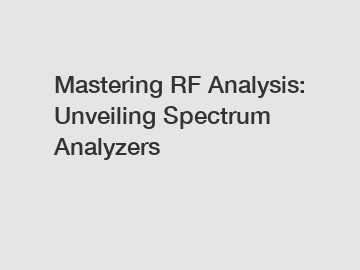Mastering RF Analysis: Unveiling Spectrum Analyzers
Google Hot Topics: Mastering RF Analysis: Unveiling Spectrum Analyzers?
Have you ever wondered how radio signals are measured and analyzed? The world of Radio Frequency (RF) analysis can be complex, but with the right tools and knowledge, understanding and mastering this field becomes easier. Spectrum analyzers, in particular, play a crucial role in RF analysis. In this article, we will delve into the working principles of spectrum analyzers, their key features, and discuss how to effectively utilize them for accurate RF measurements.
I. What is a Spectrum Analyzer?

A spectrum analyzer is an essential tool for engineers and technicians involved in radio frequency analysis. It helps in visualizing and analyzing the frequency spectrum of RF signals. By displaying the amplitude of signals over a certain frequency range, it allows professionals to identify and resolve issues within RF systems.
II. Key Features of Spectrum Analyzers.
1. Frequency Range and Resolution Bandwidth (RBW): Spectrum analyzers offer a wide range of frequency coverage, allowing analysis from a few kilohertz to several gigahertz. The RBW determines the smallest frequency changes that can be observed accurately. Higher RBW values allow for a quicker sweep across the frequency range, while lower values provide higher resolution for detailed analysis of narrowband signals.
2. Amplitude Accuracy and Dynamic Range: The ability to accurately measure signal levels is crucial in RF analysis. Spectrum analyzers offer a specified amplitude accuracy, which indicates the maximum deviation from the true value. Dynamic range refers to the ability to measure both low-level signals and high-level signals without distortion. Understanding these specifications ensures precise measurements in various scenarios.
3. Spurious and Harmonic Response: Unwanted signals can interfere with accurate measurements. Spectrum analyzers should have low spurious and harmonic response levels to avoid false readings. It is important to choose an analyzer that suppresses these unwanted signals effectively.
III. Applications of Spectrum Analyzers.
1. Signal Analysis: Spectrum analyzers provide deep insights into RF signals by displaying their frequency content and amplitude. This enables the identification of interference, harmonics, distortion, or other anomalies. With this information, engineers can optimize signal quality, troubleshoot issues, and fine-tune RF systems for optimal performance.
2. EMC/EMI Testing: Electromagnetic Compatibility (EMC) and Electromagnetic Interference (EMI) testing ensure that electronic devices do not interfere with each other or the surrounding environment. Spectrum analyzers aid in detecting and analyzing unwanted emissions and help engineers achieve compliance with regulatory standards.
3. Wireless Communication Development and Testing: Spectrum analyzers are fundamental tools for designing and testing wireless communication systems. They enable engineers to measure signal strength, analyze modulation formats, detect interference, and ensure compliance with standards like Wi-Fi or cellular networks.
IV. Best Practices for Mastering RF Analysis with Spectrum Analyzers.
1. Understanding Measurement Basics: Familiarize yourself with concepts like signal bandwidth, modulation, and filtering. This knowledge helps in interpreting the data provided by spectrum analyzers accurately.
2. Proper Calibration: Calibration ensures the accuracy of measurements. Regularly calibrating the spectrum analyzer minimizes errors and maintains the integrity of the analysis.
3. Utilizing Advanced Features: Many modern analyzers offer advanced features like markers, trace math functions, and limit lines. Mastering these features can greatly enhance your ability to analyze RF signals effectively.
4. Integration with Other Instruments: Spectrum analyzers can be integrated with other instruments, such as signal generators or oscilloscopes, to enable comprehensive RF analysis. Understanding these connections helps in achieving more efficient and accurate measurements.
In conclusion, mastering RF analysis is essential for professionals in the field of radio frequency engineering. Spectrum analyzers provide a powerful tool for gaining insights into the frequency spectrum of RF signals. By understanding the key features, applications, and best practices, engineers and technicians can unlock the full potential of spectrum analyzers, enabling accurate measurements, troubleshooting, and optimization of RF systems for various industries.
The company is the world’s best Low Frequency Spectrum Analyzer, Power Quality Analyzer Supplier, Low Cost Spectrum Analyzer supplier. We are your one-stop shop for all needs. Our staff are highly-specialized and will help you find the product you need.


